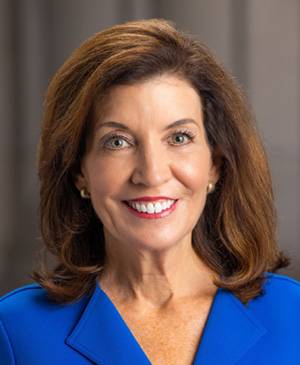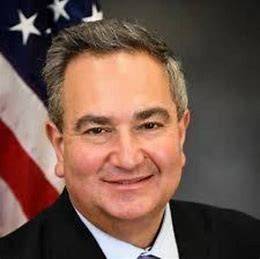Hochul pushes for parent forums, more voices, fast movement in pursuit of phone ban

Gov. Kathy Hochul visited East Syracuse Minoa Central School Thursday, and she discussed various school-related issues, including her potential ban on cell phones in the classroom. School districts, students and parents have asked for this, she says, and "we just have to work out a lot of the mechanics of how this will happen."
A partial transcript of the session was shared with The Batavian by Hochul’s office.
Hochul shared that she was excited about an upcoming state teachers’ union summit later this month. At this summit, she will bring together all of the stakeholders—teachers, administrators, and superintendents—to discuss how to “operationalize a statewide policy” for a phone ban in schools.
“And there's a lot of lessons to be learned from what other schools have already done across the country, but even here in the state of New York. Schoharie, as well, is one example, just outside of Albany. We listened to them in one of our first sessions. And some schools are purchasing the bags that are magnetic and concealed at the beginning part of the day and unlock them at the end of the day,” Hochul said. “There are other schools that are just saying don't bring them to school at all. I'm learning more about what policies are there — but in order to be a policy for the state, we would have to wait until the legislative session and to enact it there.”
A reporter asked if the law would be voted on through a budget or legislative session.
“I would like to move faster. It could be budget, but it even could be before the budget. If there is sufficient interest, they can pass bills, and I can sign them very early in the session — that's also a possibility,” she said. “We'll see what other areas we have to find common ground in if there are any obstacles. I'm working on that now already, so I would like to start off early. But the other thing that's important is to start the engagement with parents very early. So I would say, especially after this summit on the 20th, we'll be announcing where we're likely to go.”
Hochul emphasized that school districts should begin hosting parent forums now to allow conversations with other districts that have already implemented bans. This would allow them to share their concerns before taking action and how they overcame them.
“But also law enforcement. We need to invite law enforcement in to talk to parents and school districts about how, in their best judgment, if there is a crisis that unfolds in the school — you want these students to be focused 100% on the adult in the room who's going to lead them to safety,” she said. “Going on your cell phone, texting friends, capturing video — this could all put them in harm's way. And that's a strong message that I heard as I did these roundtables, and I want to make sure every parent hears and understands. There's still a process involved, but I feel even more committed than I did at the beginning of this process. After all the stories I've heard from frustrated teachers, anxious parents — and teenagers who are asking us to help save them from themselves.”
Hochul was asked if she wanted an outright ban on phones. She said her answer is in the listening tour with school districts that began earlier this year.
“That's what we're looking to — that's part of our listening process. I have personally received enough information for me to believe that we're going to need a ban. School districts have asked for this. Students have asked for this. Parents have asked for this. And we just have to work out a lot of the mechanics of how this will happen — this will take the pressure off of individual school districts,” she said. “I have heard from many superintendents who say, ‘This is hard, it's a lot for us to handle in light of our responsibilities.’ And asking the state to come up with a policy with their engagement that'll be effective.
“So that's the path we're looking at. But I also have a lot of stakeholders, and I have to work with the Legislature,” she said. “So, we will get to a point where I can announce with finality what we're going for, I still wanted to continue hearing more voices.”
For the record, Gov. Hochul, there are five voices in Genesee County stating that they don’t want a ban on cell phones in their school districts, primarily because a ban doesn’t offer teachable moments and provide lessons for responsibility for cell phone use. That was the consensus according to superintendents’ responses to questions from The Batavian.

